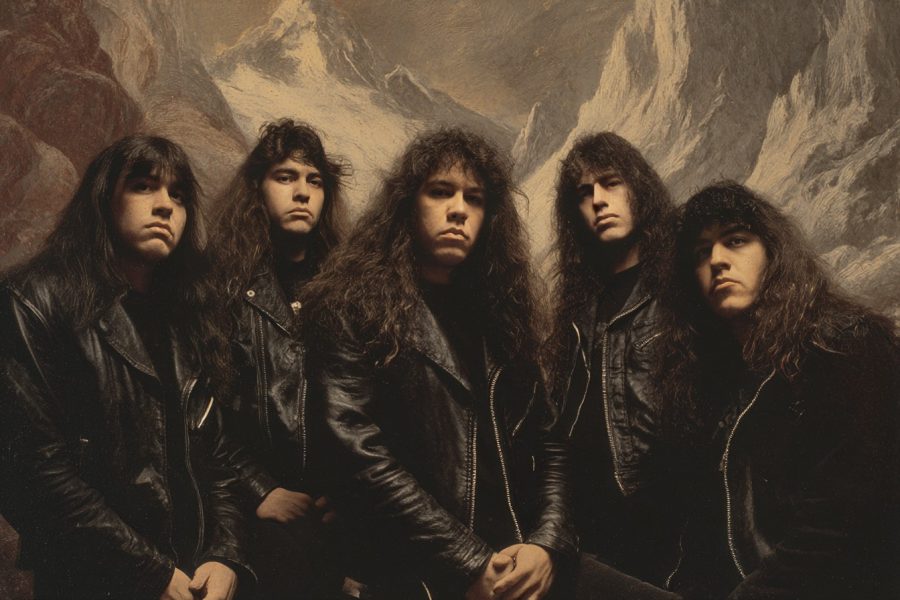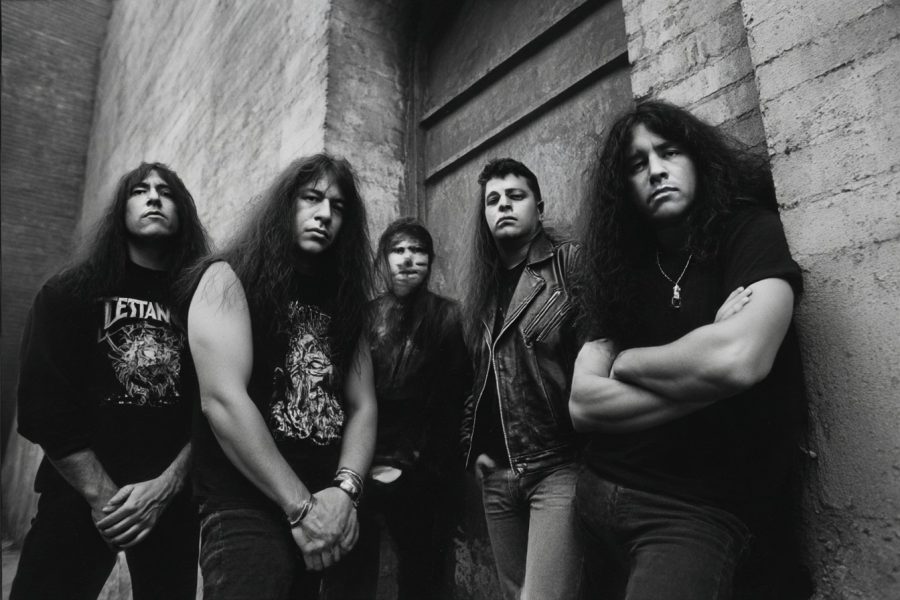I can still vividly remember the first time I heard Testament’s “The Legacy.” July 1987, visiting my buddy Tony in Berkeley. We were both 16, awkward metal obsessives with too much hair and not enough social skills. Tony had this enviable collection of thrash vinyl, much of it from local Bay Area bands that hadn’t made it to Seattle record stores yet. He put on this album by a band I’d never heard of, and within thirty seconds of “Over the Wall,” I was pacing around his bedroom, air-guitaring like a complete idiot while Tony laughed his ass off.
“Who IS this?” I kept asking. “Why haven’t I heard them before?”
Testament, originally called Legacy (hence the album title), emerged from the same Bay Area thrash scene that gave us Metallica, Exodus, and Death Angel. When their debut dropped in 1987, thrash metal was reaching its commercial and creative peak. Metallica had just released “Master of Puppets,” Slayer had unleashed “Reign in Blood,” Megadeth had put out “Peace Sells… But Who’s Buying?” and Anthrax had delivered “Among the Living.” That’s arguably the greatest single-year output in thrash history. And somehow, incredibly, Testament’s “The Legacy” deserves to be mentioned in the same breath as those albums—even if history hasn’t always been so kind.
I begged Tony to dub me a cassette copy, which I played relentlessly on my Walkman during the bus ride back to Seattle. By the time I got home, I’d worn out the rewind button replaying “Burnt Offerings” and “Apocalyptic City.” First thing I did was head straight to Tower Records to buy my own copy. The clerk—this older guy named Dave who always gave me shit for my “mainstream” metal tastes—actually nodded approvingly. “This record rips,” he said, which from Dave was essentially a Pulitzer Prize.
So what made “The Legacy” so special? Why was 16-year-old me losing his mind over it? And more importantly, why isn’t it universally recognized as one of the defining albums of the genre?
First, let’s talk about the musicianship. Alex Skolnick was simply operating on another level compared to most thrash guitarists of the era. His solos combined technical prowess with melodic sensibility in a way that few in the genre could match. While many thrash guitarists were content to shred through pentatonic scales at warp speed, Skolnick brought a jazz-informed sophistication to his playing that elevated Testament’s material beyond straightforward aggression.
The rhythm section of Greg Christian on bass and Louie Clemente on drums provided a rock-solid foundation that was tight as hell without feeling mechanical. And Eric Peterson’s rhythm guitar work created these monstrous, intricate riffs that were technical enough to impress the musicians but catchy enough to stick in your head for decades. (Seriously, I still wake up with the main riff from “First Strike Is Deadly” running through my brain at least once a month.)
Then there was Chuck Billy on vocals. Coming in to replace original singer Steve “Zetro” Souza (who left to join Exodus), Billy brought a distinctive voice to Testament that set them apart from their peers. He could deliver the aggressive thrash vocals the genre demanded, but he also had a deeper, more melodic range that gave Testament’s sound additional dimension. When he roars “Alone in the dark, sanctified haunting ground” in “Alone in the Dark,” it sends shivers down my spine to this day.
Let’s talk about the songs themselves. “The Legacy” had no filler—just nine perfectly crafted thrash metal statements. The production, handled by Alex Perialas, managed to be raw enough to maintain thrash credibility but clean enough to showcase the band’s technical prowess. It wasn’t as polished as “Master of Puppets” or as deliberately abrasive as “Reign in Blood”—it occupied its own sonic space that perfectly suited Testament’s approach.
“Over the Wall” remains one of the most exhilarating album openers in metal history—that build-up, then the explosion into the main riff, followed by Chuck’s distinctive roar. It’s the sound of a band announcing their arrival with complete confidence. “The Haunting” showcased their ability to create atmosphere alongside aggression. “Burnt Offerings” demonstrated their knack for tempo changes and progressive structures. And “Apocalyptic City” closed the album with an epic quality that hinted at the direction metal would take in the years to come.
So why didn’t Testament break through to the same level as Metallica, Slayer, Megadeth, and Anthrax—the so-called “Big Four” of thrash? Timing played a part. By 1987, the thrash hierarchy had already been established in the minds of many fans and critics. Testament arrived not as innovators but as latecomers, despite playing at a level that matched or exceeded many of their more famous contemporaries.
Marketing was another factor. Atlantic Records, while a major label, didn’t push Testament with the same vigor that other labels backed their thrash flagbearers. There was no “One” or “Peace Sells” video in heavy rotation on MTV to bring them to a wider audience. And let’s be real—some of it was just dumb luck. The music industry has never been a pure meritocracy.
I wrote a passionate defense of “The Legacy” for my high school’s newspaper, which exactly seven people read. My English teacher, Mr. Hoffmann (the secretly cool one who had seen the Ramones at CBGB), pulled me aside after class and said, “I checked out that Testament album you wrote about. Pretty impressive stuff.” Coming from him, that felt like vindication.
When I started writing professionally for music magazines years later, I made it a personal mission to champion Testament whenever possible. I interviewed Chuck Billy in 1992 around the release of “The Ritual” and couldn’t help but gush about “The Legacy.” He seemed genuinely touched by my enthusiasm, admitting, “Sometimes I think that album gets overlooked because of when it came out. Everyone was already focused on the bigger bands.”
The irony is that while “The Legacy” didn’t propel Testament to the same commercial heights as the Big Four, it established them as the best of the “second tier” thrash bands—a backhanded compliment if ever there was one. They were too good to be forgotten but somehow not quite lucky enough to break through the glass ceiling into the metal mainstream.
I got into a heated debate about this at a party in 1997 with a guy who insisted Testament was “just a Metallica knockoff.” I might have taken this disagreement too personally, because my buddy Derek had to physically separate us after I offered to “take this discussion outside.” Not my proudest moment, but in my defense—and I stand by this—calling Testament a Metallica knockoff is like calling Beethoven a Mozart knockoff just because he came a little later and worked in the same general tradition.
What’s fascinating is how well “The Legacy” has aged compared to some of its more famous contemporaries. While certain production choices or lyrical themes on some late ’80s thrash albums can feel dated now, Testament’s debut maintains a certain timelessness. The precision of the musicianship, the quality of the songwriting, and the relative lack of period-specific gimmicks has allowed it to remain vital while some once-celebrated albums have become relics of their era.
I’ve owned “The Legacy” in every available format over the years. The original vinyl I bought after my cassette wore out. The first CD pressing. The remastered edition. The deluxe reissue with bonus tracks. It’s one of those albums that I return to regularly, not out of nostalgia but because it still delivers the same punch it did when I first heard it in Tony’s bedroom in 1987.
I saw Testament live for the first time in 1988 at a relatively small club in Seattle. They were touring with Vio-lence (another criminally underrated thrash band) and absolutely destroyed the place. Skolnick’s solos were even more impressive in person, his fingers flying across the fretboard with a precision that seemed superhuman. Chuck Billy commanded the stage like he’d been born on it. And the crowd—maybe 300 people in a space meant for 200—responded like they were witnessing the second coming.
After the show, I managed to meet Alex Skolnick briefly while he was loading gear. Being the awkward teenager I was, I blurted out something incredibly profound like, “Your solos are awesome, man.” He thanked me with genuine politeness, then asked if I played guitar too. When I mentioned I was trying to learn “First Strike Is Deadly,” he actually took a minute to show me the picking technique for the main riff. I didn’t wash my right hand for days afterward, as if his technique might somehow transfer through skin contact.
One of the most gratifying developments of recent years has been the gradual reassessment of Testament’s place in metal history. As the decades have passed, more and more fans and critics have come to recognize what some of us were screaming about back in 1987—that “The Legacy” belongs in the pantheon of all-time great thrash albums. The band’s continued excellence through the years, delivering quality albums well into the 2010s and 2020s, has only reinforced their reputation as one of metal’s most consistent forces.
I interviewed Alex Skolnick in 2012 for a retrospective piece on the Bay Area thrash scene. When I brought up “The Legacy” and its place in thrash history, he seemed both proud of the album and philosophical about Testament’s commercial trajectory. “We were always the band that other musicians respected,” he said. “For a long time, that was both a blessing and a curse. But at this point, I’m just grateful that the music has endured.”
And endure it has. Songs like “Over the Wall,” “Burnt Offerings,” and “Apocalyptic City” have become standards in Testament’s live shows, connecting multiple generations of metal fans. When I saw them play in 2019—32 years after “The Legacy” was released—the crowd went just as berserk for those early classics as they did for newer material. Time has been kind to these songs in a way that it hasn’t been to some of their contemporaries’ work.
What’s particularly impressive about “The Legacy” is how it balances youthful aggression with mature musicianship. Most debut albums, especially in thrash metal, succeed primarily on their raw energy and hunger. Testament certainly had that hunger, but they also displayed a musical sophistication beyond their years. It’s an album that satisfies your need to headbang while also rewarding closer, more analytical listening—a rare combination in any genre.
If you’ve never heard “The Legacy,” or if you’ve dismissed Testament as second-tier thrash, I urge you to revisit this album with fresh ears. Play it loud (the only acceptable volume for thrash), and pay attention to the intricate interplay between Skolnick’s solos and Peterson’s rhythm guitar, the way Chuck Billy’s vocals shift between aggression and melody, the thoughtfulness of the arrangements.
In a just world, we’d talk about the “Big Five” of thrash, with Testament rightfully included alongside Metallica, Slayer, Megadeth, and Anthrax. “The Legacy” makes that case as eloquently as any album could—nine songs of technically precise, emotionally resonant thrash metal that stands toe-to-toe with the genre’s most celebrated works.
I still remember Tony’s knowing smile when he first played me that record, watching my reaction as “Over the Wall” kicked in. He knew exactly what was about to happen—that I was about to have my teenage mind completely blown by a band that deserved way more recognition than they were getting. Thirty-five years later, I’m still evangelizing about “The Legacy,” still insisting that Testament deserves their place in the thrash metal pantheon. Some obsessions you never outgrow. And some albums justify that lifelong devotion.

